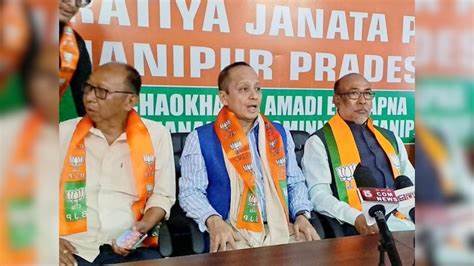The Law Minister of the conflict-torn state has secured a Bharatiya Janata Party (BJP) ticket for the upcoming Lok Sabha polls. The decision has sparked controversy and raised eyebrows, given the backdrop of ongoing unrest and the delicate socio-political landscape of the region.
The selection of a prominent figure from the ruling party’s ranks for a crucial electoral contest has intensified speculation and drawn attention to the intricacies of Manipur’s political dynamics. The Law Minister’s nomination has triggered a range of reactions, from staunch support within the party to skepticism and criticism from opposition factions and civil society groups.
Manipur, nestled in India’s northeastern frontier, has grappled with protracted insurgency, ethnic tensions, and governance challenges for decades. Against this backdrop, the decision to field a sitting minister for a parliamentary seat assumes heightened significance and warrants careful examination of its implications.
On one hand, supporters of the Law Minister’s candidature argue that his nomination reflects the BJP’s confidence in his leadership abilities and track record as a seasoned politician. They point to his experience in navigating the complex legal and administrative landscape of Manipur, advocating for the party’s agenda, and championing initiatives aimed at fostering peace and development in the region.
Furthermore, proponents of the move assert that the Law Minister’s candidacy aligns with the BJP’s broader strategy of consolidating its presence in the northeastern states and strengthening its electoral prospects in the region. By fielding a candidate with a deep understanding of Manipur’s socio-political milieu, the party aims to leverage local insights and grassroots support to secure victory in the Lok Sabha polls.
However, critics of the decision raise valid concerns about the potential ramifications of nominating a sitting minister for a parliamentary seat, particularly in a state grappling with governance challenges and simmering discontent. They argue that the move could exacerbate existing grievances and fuel perceptions of political favoritism, further eroding public trust in the democratic process.
Moreover, opposition parties and civil society organizations have questioned the timing of the Law Minister’s nomination, citing the need for greater focus on addressing pressing issues such as socio-economic development, insurgency, and ethnic reconciliation in Manipur. They argue that prioritizing electoral politics over governance imperatives risks diverting attention from critical priorities and undermining efforts to foster stability and progress in the state.
The decision has also reignited debates about the BJP’s approach to governance and representation in conflict-affected regions. Critics accuse the party of prioritizing electoral gains over the long-term interests of Manipur’s populace, raising doubts about its commitment to inclusive and participatory democracy in the state.
In response to the controversy surrounding the Law Minister’s candidature, the BJP has defended its decision, emphasizing the need for a strong and effective leadership to navigate the complex challenges facing Manipur. Party leaders have reiterated their confidence in the minister’s ability to represent the aspirations of the people and deliver on the BJP’s vision for the state’s development and prosperity.
As the political discourse in Manipur continues to evolve in the run-up to the Lok Sabha polls, the Law Minister’s candidacy serves as a focal point for broader discussions about governance, representation, and the future trajectory of the state. The upcoming electoral contest presents an opportunity for voters to scrutinize the policies and priorities of political parties and make informed decisions that resonate with their aspirations and concerns.
In addition, the nomination of Manipur’s Law Minister as a BJP candidate for the Lok Sabha polls has sparked controversy and stirred debate within the state’s political landscape. While supporters view it as a strategic move to strengthen the party’s foothold in the region, critics raise questions about its implications for governance and representation in conflict-affected areas. As the electoral campaign unfolds, the Law Minister’s candidacy will undoubtedly remain a subject of scrutiny and discussion, shaping the contours of Manipur’s political future.


